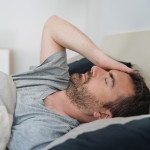I posted this on the Fullscript site this morning, and it got so much attention I figured I would tweak it a bit and re-post it here. High quality sleep is so, so important! And if I can help folks with advice that few others are offering, that makes me very happy.
For sleep support, I like to look at the in-obvious places. Anyone and everyone seems to coach about sleep hygiene: electronic device use, cool rooms and even blue light blocking glasses. Give me a break. We can do better than that.
To sleep well you need to eat well. (And it doesn’t hurt to walk 2 miles daily, spend alot of time outdoors preferably raking leaves, playing soccer or shoveling snow, or have regular orgasms. Maybe all three. But you can alternate the first two.) Think plant heavy Paleo with abundant sea creatures mixed in a couple times a week. Or, viewed from the other side, vegetarian (but actually eating lots of plants) with lots of healthy fats and regular doses of super nutrient-dense organ meat, crustaceans & sea vegetables
I am a big fan of minerals, since very few of us get what we need through diet alone (unless we are lucky enough to have our own organic vegetable gardens & live near an ocean): especially magnesium + potassium-— and zinc, possibly even more so, for folks taxed with lifelong suppression of chronic viral infections, and aging men— but also some of the minerals considered “trace,” chief among them iodine, boron, manganese, lithium.
I generally discourage folks from taking calcium supplements unless it’s a top, top grade source and taken together with vitamin K2 and magnesium. Most calcium supplements end up lining your blood vessels (and calcifying other tissues); not exactly the desired effect...
Probiotics, whether via fermented foods or capsules, also seem to help although some species/strains have more research behind them than others. Reuteri, helveticus, longum, possibly also rhamnosus & plantarum would likely be among the top species to focus on for so-called gut-brain or “psychobiotic” effects. Last month’s post was all about L. reuteri. And I have recently teamed it up with the mood-boosting effects of helveticus & longum. So much fun to experiment this way. I highly recommend it if you are so inclined.
Folks that find themselves incorrigibly fidgety or absolutely incapable of turning off mind chatter might want to look into gut health; that is to say, bacterial and/or fungal overgrowths— most definitively diagnosed via an Organic Acids Test (both Great Plains Labs and Genova Diagnostics offer one; it requires simple “first morning void” urine sample and is super cool since it, in a way, shows you the “foot prints” or maybe more accurately thought of as the “forest droppings” of creatures living inside you that are super shy and difficult if not impossible to actually catch a glimpse of) or stool tests like GI-Map and GI Effects. Who knew these microscopic critters living inside you could affect neurotransmitter pathways & brain function? It’s an absolutely fascinating field of study and, Alice In Wonderland-like, one you can easily get lost in. I think my next blog post will be a streamlined tour d’horizon & summary of recent literature just on this!
Almost everyone in our society has some degree of fungal and/or bacterial overgrowth in the gut, but it’s helpful to know what’s actually there before a treatment is selected. The stool test companies provide sensitivity analyses for the most common prescription and botanical remedies, so that can be helpful. Failing that, some super simple, everyday things like the alkaloids from both green or black tea (but also uva ursi, pau d’arco and some other less common teas), many, many culinary spices (usually fresh and used in abundance: chief among them oregano, thyme, rosemary, dill) as well as the perennially prized raw garlic are often enough for daily maintenance.
Finally, people plagued by 2 or 3 a.m. waking are often actually experiencing blood glucose crashes that wake them up. (The body releases a burst of cortisol to free up glucose stores in the body, and that in turn gets that whole catecholamine cascade going: cue racing mind & panicky thoughts.) Getting more fat in the evening meal (and surprise, fewer simple carbs— including alcohol, especially during those last few hours before bed) usually does the trick.
Longer term you will want to work towards greater “metabolic flexibility,” but chronic stress can work against this, so that too might need to be addressed. In the meantime, a tiny dose of Dhea— 5-10 mg— at bedtime seems to support deep slow-wave or "delta" sleep.
(Quicksilver Scientific’s mad genius (or just mad?) founder/CEO Christopher Shade (PhD) might counter that it was NAD+ (NAD+ Platinum) that really helped turn his delta sleep around. Taken in the morning/day— not at night. Clinical trials, anyone?)
Of course, you can get (just about) all the vitamins, minerals, fats and proteins you need from food, but to do so you’d need to adopt a Terry Wahls “reversing Multiple Sclerosis” type eating plan: 2-3 cups each daily of dark leafy greens, blue/black/purple/red berries, cruciferous veggies + allium, mushrooms, fatty fish, organ meats, seaweed & crustaceans. It can be done, but it takes real commitment & probably a “this can be fun” attitude!
Mike Barr, a longtime Poz Contributing Editor and founding member of and scribe for the Treatment Action Group (TAG), is a functional medicine practitioner and herbalist in NYC. Reach out to him here. Or sign up for his curated (and generously discounted) professional grade supplement store here.








Comments
Comments